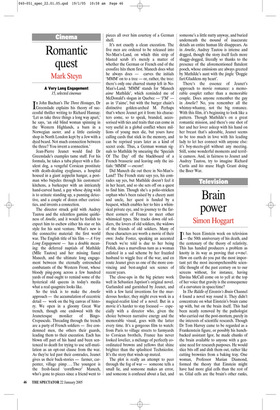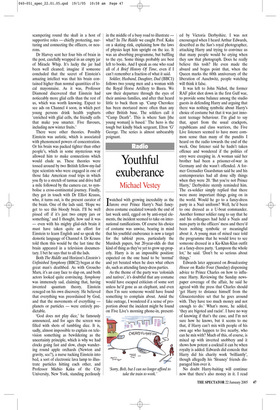Brain power
Simon Hoggart
It has been Einstein week on television — the 50th anniversary of his death, and the centenary of the theory of relativity. This has handed producers a problem as knotty in its way as proving that e=mc2. How on earth do you put the most important yet the most incomprehensible scientific thought of the past century on to our screens without, for instance, having Davina McCall come on to yell at the top of her voice that gravity is the consequence of a curvature in space/time?
In The Riddle of Einstein’s Brain Channel 4 found a novel way round it. They didn’t concentrate on what Einstein’s brain came up with, but on the brain itself. This had been neatly removed by the pathologist who carried out the post-mortem, purely in the interests of scientific research. Though Dr Tom Harvey came to be regarded as a Frankenstein figure, or possibly his hunchbacked assistant Igor, he made chunks of the brain available to anyone with a genuine need for research purposes. He would slice bits off and dish them out, rather like cutting brownies from a baking tray. One woman, Professor Marian Diamond, formed the theory that Einstein might have had more glial cells than the rest of us. Glial cells are the brain’s other ranks, scampering round the skull in a host of supportive roles — chiefly protecting, nurturing and connecting the officers, or neurons.
Dr Harvey sent her four bits of brain in the post, carefully wrapped in an empty jar of Miracle Whip. It’s lucky the jar had been well cleaned; imagine if someone concluded that the secret of Einstein’s amazing intellect was that his brain contained higher than normal quantities of local mayonnaise. As it was, Professor Diamond discovered that Einstein had noticeably more glial cells than the rest of us, which was worth knowing. Expect to see ads on Channel 4 soon, in which pert young persons drink health yoghurts ‘enriched with glial cells, the friendly cells that make you smarter. Five flavours, including new winter fruits.’ There were other theories. Possibly Einstein was autistic, which is associated with phenomenol powers of concentration. Or his brain was packed tighter than other people’s, which in some mysterious way allowed him to make connections which would elude us. These theories were tossed around by two British fellow-my-lad type scientists who were engaged in one of those fake American road trips in which you fly to a stretch of tarmac and drive half a mile followed by the camera car, to symbolise a cross-continental journey. Finally, they got in touch with Dr Elliot Krauss, who, it turns out, is the present curator of the brain. One of the lads said, ‘Hope we get to see this bloody brain. I’ll be well pissed off if it’s just two empty jars or something,’ and I thought, how sad it was — even with his mighty glial-rich brain it must have taken quite an effort for Einstein to learn English and so speak the demotic language of Channel 4. Dr Krauss told them this would be the last time the brain appeared in a television documentary. I bet he says that to all the lads.
Both The Riddle and Horizon’s Einstein’s Unfinished Symphony (BBC2) began at the great man’s deathbed. As with Groucho Marx, it’s an easy face to slap on, and both actors looked quite convincing. Symphony was immensely sad, claiming that, having invented quantum theory, Einstein reneged on his own discovery. He believed that everything was preordained by God, and that the movements of everything planets or particles — were entirely predictable.
‘God does not play dice,’ he famously announced, and for ages the screen was filled with shots of tumbling dice. It is, sadly, almost impossible to explain on television something as bewildering as the uncertainty principle, which is why we had clocks going fast and slow, chaps wandering round apple orchards (Newton and gravity, see?), a nurse tucking Einstein into bed, a sort of electronic lava lamp to illustrate particles hitting each other, and Professor Michio Kaku of the City University, New York, standing perilously in the middle of a busy road to illustrate what? In The Riddle we caught Prof. Kaku on a skating rink, explaining how the laws of physics kept him upright on the ice. It was an absorbing programme, but baffling to the eye. Some things probably are best left to books. And I speak as one who read all of A Brief History Of Time, even if I can’t remember a fraction of what it said.
Soldier, Husband, Daughter, Dad (BBC1) follows two young men and a woman with the Royal Horse Artillery to Basra. We saw their departure through the eyes of their anxious families, and after that heard little to buck them up. ‘Camp Cherokee has been mortared more often than any other British base. The soldiers call it “Camp Death”. This is where Sam [the young woman] is based.’ The hero is the tough but kindly black sergeant, Elton ‘G’ George. The series is almost unbearably poignant.














































 Previous page
Previous page